2025 ADEA Triennale
Strengthening the resilience of Africa’s educational systems: advancing towards ending learning poverty by 2035 with a well-educated and skilled workforce for the continent and beyond.

October 29 - 31 2025 Accra, Ghana
The Association for the Development of Education in Africa (ADEA) hosted its 2025 Triennale, bringing together policymakers, educators, researchers, innovators, and development partners to chart a new course for Africa's educational future. Alongside more than 800 participants attending both in person and online, they worked to build resilient education systems, promote inclusive learning, and strengthen partnerships to accelerate progress.
Working with our partners to transform secondary and post-secondary education and skilling, we aim to enable the potential of 30 million young people, including young women, refugees, displaced persons, and people with disabilities, to access pathways for dignified and fulfilling work.
Watch the highlight video of the ADEA Triennale 2025
During the three-day ADEA Triennale, the Mastercard Foundation, represented by our Chief Program Officer Peter Materu, and select team leaders from Education and Transitions, participated in and co-hosted key sessions that underscored the importance of secondary education as a bridge between learning and livelihoods, and a cornerstone of Africa's economic and social transformation.

Africa’s young people are the most important asset that the continent has, now and for a long time to come. To unlock that potential, we must strengthen secondary education.
Remarks by Peter Materu, Chief Program Officer, Mastercard Foundation, emphasized the critical role that secondary education plays as the most effective pathway to dignified and fulfilling work for people across Africa

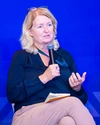

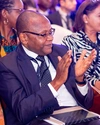

Day One: Discussing “Secondary Education as the Main Platform to Work: Pathways for Africa’s Youth.”
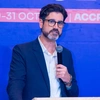
Africa’s young people are not just the future of this continent - they are the present. And they are ready. Ready to learn, to build, to lead, and to drive inclusive and sustainable growth. But we must match their readiness with opportunity. Secondary education is the gateway to those opportunities.
James McIntyre, Director, Secondary Education and TVSD Initiatives during his opening statement.
Day One Panel
The panel emphasized that partnerships are essential to ensure education priorities are shared beyond governments. Ruth Tawiah, a CAMFED Association member and Mastercard Foundation Alumna, highlighted how education transforms the lives of young women like her. Other panelists included Kim Kerr (Director of Strategy & Programming, Education & Transitions), Robin Todd (Executive Director, T-TEL), and Pia R. Britto (Global Director, Education and Adolescent Development, UNICEF).

Day Two: The power of storytelling in “Education: Transforming Lives, Transforming Africa”.
Hosted by ALADI in partnership with the Mastercard Foundation, this session showcased visual impact stories of expanding access to education - underscoring the importance of investing in young people. ALADI President and CEO Julie Gichuru opened with a call to harness youth energy by prioritizing education.
Peter Materu's remarks underscored the importance of sharing our own stories
“This is a conversation in Africa, by Africa, about African issues, led by Africa. We need to have more of these conversations. Our Young Africa Works strategy, launched approximately seven years ago, aims to enable our young people, particularly those from marginalized backgrounds, to grow and prosper. Education is a powerful means of enabling young people to make a positive impact in their lives and communities. At the Mastercard Foundation, we focus on education and financial inclusion because we believe that the most important asset that we have is young people.”

An open conversation on the gaps and missing links in educating young people had panelists opening up about the need to invest in skills data. They stressed the need for interconnected systems, supported by data, collaboration, and leadership, can create dynamic, equitable, and employment-oriented education ecosystems. On the panel were representatives from the Forum for African Women Educationalists (FAWE), Global Partnership for Education (GPE) and CAMFED-Ghana.

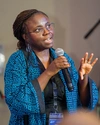
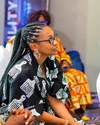
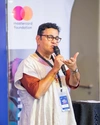
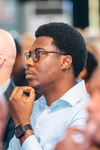
To conclude the Triennale side events, the team co-led a consultative session with the World Bank on the Digital Skills for Africa report: How to empower young people for the future workforce. Moderated by Suraj Shah, Head of Strategic Partnerships and Thought Leadership, the session shared key findings and invited feedback on gaps and recommendations for equipping young Africans with market-aligned skills. Achieving this requires harmonizing curricula across the continent with future workforce needs.
Showcasing African-led Educational Technologies (EdTech)
The ADEA Triennale showcased EdTech solutions, which are innovating to improve education outcomes. Twelve Mastercard Foundation EdTech Fellows from Ghana showcased their solutions and gained a platform to share their product offerings with education leaders.

Across all Foundation-led sessions, young voices took center stage - underscoring that investing in youth isn’t optional, it is essential. Six young people, including five Scholars Program alumni, shared powerful stories of how education transformed their lives and empowered them to uplift others.
Naomi Mumbi Kamitha, another alumna of the Mastercard Foundation Scholars program and now program officer at FAWE Africa, summed up the youth voice with this message:
“Trust us and walk the journey with us, as we make some mistakes, we will learn because you will be there to guide us with the wisdom that you have. Show some radical trust. Don’t wait for us to get ready. Allow us to get ready with you while you still have the energy.”
The ADEA Triennale concluded with a call to action, urging leaders to prioritize education and find innovative solutions to drive progress. Africa's young people are its important asset, now and for a long time to come. To unlock that potential, we must strengthen secondary education.

Supporting African Youth
The Mastercard Foundation Education and Transitions platform works to ensure that young people across Africa have access to quality and relevant education and skills to transition into dignified and fulfilling work.

